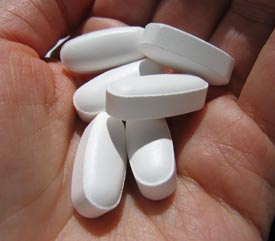 I really wanted this study to vindicate my claim that a gram or more of supplemental calcium (Ca) a day couldn't possibly be what the evolutionary king intended, and therefore couldn't possibly be a failsafe bone-saving device. I really, really wanted to cry "I told you so!"
I really wanted this study to vindicate my claim that a gram or more of supplemental calcium (Ca) a day couldn't possibly be what the evolutionary king intended, and therefore couldn't possibly be a failsafe bone-saving device. I really, really wanted to cry "I told you so!"But I can't. Not yet at least. Certainly not by the results of this massive $18 million (tax-dollared), 7-year, 36,282-woman-strong, government-sponsored clinical trial:
Calcium plus Vitamin D Supplementation and the Risk of Fractures
Here's a New York Times' summary:
Big Study Finds No Clear Benefit of Calcium Pills
It's not that the study found any great benefit to taking supplemental Ca plus vitamin D (CaD). In fact, its findings were pretty nebulous:
- A mere 1% increase in bone density at the hip
- Similar rates of bone fracture between treatment and control groups
- Similar rates of colorectal cancer (calcium was previously thought to be protective) between treatment and control groups
1. Because unambiguous benefit might have been found if the study's design was a hair more rigid. You'd at least want to see a control group with intake of CaD measurably different from the intervention group. That wasn't the case here. The control group was allowed to follow their regular diet and take any supplements they wanted, up to 1000 mg Ca and 600 IU vitamin D. The intervention group received 1000 mg Ca and 400 IU vitamin D. I'm shuddering to think that allowed instances where the control group actually had a higher intake.
Since participants were not restricted from taking personal calcium or vitamin D supplements, they had a relatively high calcium and vitamin D intake at enrollment and intake rose even higher during the trial so the impact of study supplementation may have been muted.2. Because I'm not convinced that doctors, dietitians, or other delegates of health, not least of which calcium supplement makers ($993 million from sales in 2004), will stop recommending sizeable daily doses of Ca based on this uncertain outcome. Since the study was too big to be repeated anytime soon, if you have a political, economic, or career-minded interest in seeing Ca venerated, you'll spin these results to your liking:
- Jean Wactawski-Wende, PhD. Study’s lead investigator. From NIH press release.
“The study’s findings of slowed bone loss and the reduction in hip fractures for some groups suggest a role for these supplements in preventing hip fracture in generally healthy postmenopausal women and support the current Surgeon General’s recommendations for these nutrients.”I personally have a tough time reconciling how the study's findings that CaD did not significantly reduce fractures equates to "support [for] the current Surgeon General’s recommendations for these nutrients". Oh, the politics of nutrition.
- Joan McGowan PhD. Senior scientific editor of the Surgeon General’s report on bone health and co-author of this paper.
There was one finding I'm quietly relishing - because it legitimizes my atypical calcium-supplement stand. The women who took the CaD supplements had a 17% increase in kidney stones. That was on only 1000/mg Ca - or less - considering only 59% of the women in the treatment group took the full dose. The passing of a stone is one painful proposition, one that shouldn't be discarded lightly (the proposition, not the stone).
 I know I'm in the minority, especially among my health-community peers, but I hold to the belief that there are lots of things a woman can do to protect her bones other than engage in lopsided pill-popping. It looks like the president of the National Osteoporosis Foundation, Dr. Ethel Siris, is sidling up to that idea:
I know I'm in the minority, especially among my health-community peers, but I hold to the belief that there are lots of things a woman can do to protect her bones other than engage in lopsided pill-popping. It looks like the president of the National Osteoporosis Foundation, Dr. Ethel Siris, is sidling up to that idea:"Enough is enough," Dr. Siris said. "Too much of a good thing isn't a good thing."I guess this leaves me still sitting on my hands waiting for someone to show why my breakfast doesn't have to look like NASA space food rations.
No comments:
Post a Comment